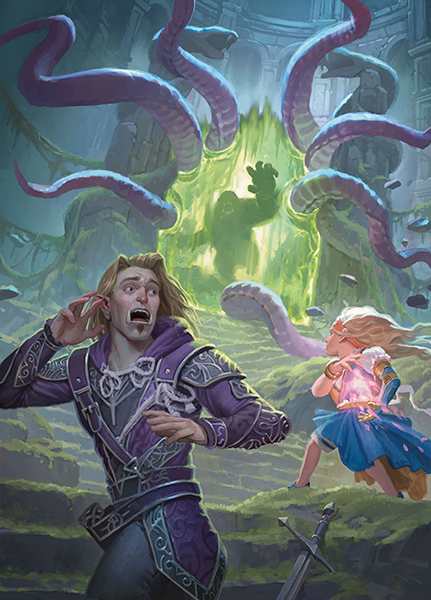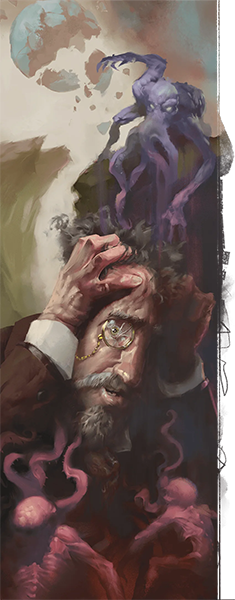Insanity
In most campaigns, heroic characters will rarely suffer any mental scars from the day-to-day violence & stress of adventuring. However, in the Domains of Dread & other settings with strong horror elements there is a risk that constant fear & terror will wear down even the most resolute champion. Use the suggested rules below if you believe that adding such consequences will add a fun & immersive element to your game.
WARNING
While the situations that cause insanity can provide interesting consequences during both encounters & roleplay, it is also important to be sensitive to how players feel about the depictions of trauma & mental health. Fiction & pop culture has helped to perpetuate misconceptions about mental illness in general, so attempting to replicate the causes, symptoms, or treatments of any real-world mental illnesses or neurodivergent behaviors in a fantasy setting is a potential minefield. Discuss with your players before including such elements in your game, such as a part of a session zero.
Going Insane
There are a variety of ways that a character can begin to develop symptoms of insanity. The wear & tear of repeated trauma or a sudden, life-shattering event can cause enough damage to cause characters to begin going insane. In other cases, insanity can be induced by magical means like a curse or a spell.
Mundane Insanity
Mundane insanity refers to the kind of mental trauma that can comes as a non-magical reaction to events or environmental factors. A character that witnesses some great act of barbarity or a truth that shatters their previous perception of the world could have a sudden bout of temporary insanity with the risk of leaving scars on their psyche. Meanwhile, another character that has long suffered great cruelties will likely have developed behaviors that either help them cope or show how vulnerable the experience left them. Examples of depicting mundane insanity are as follows:
Due to the causes of mundane insanity often being somewhat based on real psychology, DM's players should be particularly cautious about how it is depicted within game. Parallels with real conditions, intentional or otherwise, could be triggering for some players. Also, overusing insanity checks will cause players to become bored with the mechanic, lessening the impact it can have on the game's narrative.
Magical Insanity
Magical Insanity refers to any symptoms of insanity that directly results from a magical cause. One such example would be the result of curse altering a character's personality. Another would be the result of creating a magical poison or casting a spell with the direct purpose of causing the target to become insane. The latter example would likely result from modified spells or homebrew items that have been allowed by the DM. In both examples, the insanity can't be cured without removing the magical cause, such as by removing the curse or by casting a healing spell.
Insanity Tables
When a character fails an Insanity check, they must roll on one of the tables below to see what symptom of insanity they experience. These are divided into mild temporary insanity, severe temporary insanity, & permanent insanity.
Mild Temporary insanity can last up to 10 minutes, causing the afflicted character to be unable to behave normally would due to a condition like being Frightened, Incapacitated, Stunned, or some other effect. As long as these symptoms are not the result of a curse, they can be suppressed with the Calm Emotions spell or removed with the Lesser Restoration spell.
Severe Temporary insanity can last up to 6 days, causing the player to struggle as an adventurer due to symptoms interfering with attack rolls, ability checks, & saving throws. As long as these symptoms are not the result of a curse, they can be suppressed with the Calm Emotions spell or removed with the Lesser Restoration spell.
Permanent insanity is an indefinite effect that gives the character a new personality flaw to grapple with & that lasts until the character is cured. As long as these symptoms aren't the result of a curse, they can be suppressed with the Calm Emotions spell or removed with the Greater Restoration spell.
Mild Temporary Insanity
| d100 | Effects (duration is 1d10 minutes) |
|---|---|
| 01-20 | The character becomes catatonic, retreating into their mind & becoming paralyzed. The effect ends if the character takes any damage. |
| 21-30 | The character becomes incapacitated & spends the duration laughing, screaming, or weeping. |
| 31-40 | The character becomes frightened & must use their action & movement flee from the source of their fear. |
| 41-50 | The character babbles incoherently for the duration & is incapable of normal speech or spellcasting. |
| 51-60 | The character must use their action each round to attack the nearest creature. |
| 61-70 | The character experiences vivid hallucinations that cause them to have disadvantage on ability checks. |
| 71-75 | The character becomes extremely compliant, obeying any order that isn't obviously self-destructive. |
| 76-80 | The character experiences the irresistible urge to consume something strange, such as dirt, slime, or offal. |
| 81-90 | The character is stunned. |
| 91-100 | The character falls unconscious. |
Severe Temporary Insanity
| d100 | Effect (Duration is 1d6 days) |
|---|---|
| 01-10 | The character is compelled to repeat a specific task, such as washing hands, touching something, praying, counting items, etc. for 1d10 minutes each day. |
| 11-20 | The character experiences vivid hallucinations that give them disadvantage on ability checks. |
| 21-30 | The character suffers an extreme bout of paranoia. They have disadvantage on Wisdom & Charisma checks. |
| 31-40 | The character suffers an intense revulsion for a particular location, object, or person, as if under the antipathy effect of the Antipathy/Sympathy spell. |
| 41-45 | The character suffers a powerful delusion. The character imagines they are under the effect of a random magical potion. |
| 46-55 | The character becomes attached to a "lucky charm," such as an object or person, & has disadvantage on attack rolls, ability checks, & saving throws while more than 30' from it. |
| 56-65 | The character suffers from either hysterical blindness (25%) or hysterical deafness (75%). |
| 66-75 | The character experiences uncontrollable tremors or tics, imposing disadvantage on all attack rolls, ability checks, & saving throws that involve Strength or Dexterity. |
| 76-85 | The character becomes highly distracted & unable to focus. They have disadvantage on Intelligence & Wisdom ability checks & have disadvantage when making concentration checks for spells & special abilities. |
| 86-90 | Whenever the character takes damage, he or she must succeed on a DC 15 Wisdom saving throw or be affected as though under the Confusion spell. The confusion lasts for 1 minute. |
| 91-95 | The character becomes mute & unable to speak. |
| 96-100 | The character falls unconscious. No amount of jostling or damage can wake the character. |
Permanent Insanity
| d100 | Personality Flaw |
|---|---|
| 01-15 | "Being drunk keeps me sane." |
| 16-25 | "I keep whatever I find." |
| 26-30 | "I try to become more like someone else I know—adopting his or her style of dress, mannerisms, and name." |
| 31-35 | "I must bend the truth, exaggerate, or outright lie to be interesting to other people." |
| 36-45 | "Achieving my goal is the only thing of interest to me, and I'll ignore everything else to pursue it." |
| 46-50 | "I find it hard to care about anything that goes on around me." |
| 51-55 | "I don't like the way people judge me all the time." |
| 56-70 | "I am the smartest, wisest, strongest, fastest, and most beautiful person I know." |
| 71-80 | "I am convinced that powerful enemies are hunting me, and their agents are everywhere I go. I am sure they're watching me all the time." |
| 81-85 | "There's only one person I can trust. And only I can see this special friend." |
| 86-95 | "I can't take anything seriously. The more serious the situation, the funnier I find it." |
| 96-100 | "I've discovered that I really like killing people." |





Comments